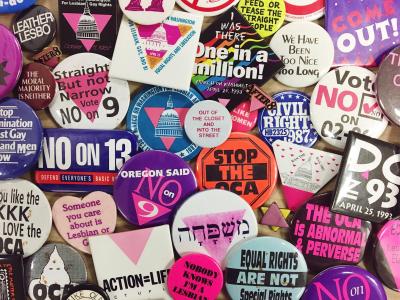In celebration of Oregon Archives Month, SCARC staff have pulled together a few of their favorite things in our collections. This is the third in the series.
The After 8 pins are part of the After 8 Records, a collection that documents the political activism and community outreach work of the After 8 organization, an group which operated in Benton County from 1989 to 2002, but was primarily active during the 1990s.

“After 8” is in reference to and a response to Ballot Measure 8. In November of 1988, Ballot Measure 8 passed in the state of Oregon, effectively rescinding Governor Goldschmidt’s 1987 Executive Order 87-20 prohibiting discrimination on the basis of sexual orientation in the executive branch of the state government. In addition to the dismantling of this previous protection, Ballot Measure 8 introduced a new law allowing state officials to take the sexual orientation into account in making personnel decisions, and preventing them from acting on reports of such discrimination. Thus, the ballot measure effectively made it legal to discriminate at all levels of state government on the basis of sexual orientation, then defined as homosexual, heterosexual, and bisexual.
In response to Ballot Measure 8, a group of women in Benton County met in the week following its passage to discuss the potential for mobilization within the local gay and lesbian community. By December of that same year, a group of lesbian and gay community members and their allies were meeting bi-weekly, and in January of 1989, the group was given a name—”After 8″. Their mission became “To create conditions which ensure that all persons are protected from any discrimination based on sexual orientation.” Throughout the group’s lifetime, After 8 sought to achieve this mission through education and advocacy—working with members of the community, engaging in political activity, networking with individuals, organizations, businesses, and institutions, and effectively making themselves visible as active participants of the local community. After 8 operated in Benton County from 1989-2002.
Pins are an easily visible, portable, and effective form of community activism, and the After 8 pins are both fun and informative. Some of the pins such as “Stop the OCA” reference the Oregon Citizens Alliance, a conservative Christian political organization that proposed the anti-LGBTQ+ rights Measure 9; some pins like “Straight but not narrow, vote no on 9” show the allyship from non-LGBTQ+ community members; and some pins like “leather lesbo” are timeless.
In addition to their historic value for researchers to incorporate in their scholarship, the After 8 pins are always a hit when used as part of SCARC instruction sessions and they make for great exhibit pieces.
Natalia Fernandez is currently serving as SCARC’s Interim Director. In her permanent role, she is the curator of the Oregon Multicultural Archives, OSU Queer Archives, and OSU DisAbility Archives; she also serves as the Supervisor of the OSULP Diversity Scholars Program. She has been with OSU for over 10 years and her office is located in the 3rd floor archives workroom.

